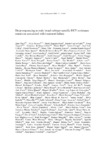Mostrar o rexistro simple do ítem
Deep-Sequencing Reveals Broad Subtype-Specific HCV Resistance Mutations Associated with Treatment Failure
| dc.contributor.author | Chen, Qian | |
| dc.contributor.author | Perales, Celia | |
| dc.contributor.author | Soria, María Eugenia | |
| dc.contributor.author | García-Cehic, Damir | |
| dc.contributor.author | Gregori, Josep | |
| dc.contributor.author | Rodríguez-Frías, Francisco | |
| dc.contributor.author | Buti, M. | |
| dc.contributor.author | Crespo, Javier | |
| dc.contributor.author | Calleja, J.L. | |
| dc.contributor.author | Tabernero, David | |
| dc.contributor.author | Vila Salvador, Marta | |
| dc.contributor.author | Lázaro, Fernando | |
| dc.contributor.author | Rando-Segura, Ariadna | |
| dc.contributor.author | Nieto-Aponte, Leonardo | |
| dc.contributor.author | Llorens-Revull, Meritxell | |
| dc.contributor.author | Cortese, Maria Francesca | |
| dc.contributor.author | Fernández, Irati | |
| dc.contributor.author | Castellote, José | |
| dc.contributor.author | Niubó, Jordi | |
| dc.contributor.author | Imaz, Arkaitz | |
| dc.contributor.author | Delgado, Manuel | |
| dc.contributor.author | Cañizares, Angelina | |
| dc.contributor.author | Castro-Iglesias, Ángeles | |
| dc.date.accessioned | 2020-10-14T10:51:18Z | |
| dc.date.issued | 2019-12-16 | |
| dc.identifier.citation | Chen Q, Perales C, Soria MG, et al. Deep-sequencing reveals broad subtype-specific HCV resistance mutations associated with treatment failure. Antiviral Res. 2020; 174:104694 | es_ES |
| dc.identifier.issn | 0166-3542 | |
| dc.identifier.uri | http://hdl.handle.net/2183/26418 | |
| dc.description.abstract | [Abstract] A percentage of hepatitis C virus (HCV)-infected patients fail direct acting antiviral (DAA)-based treatment regimens, often because of drug resistance-associated substitutions (RAS). The aim of this study was to characterize the resistance profile of a large cohort of patients failing DAA-based treatments, and investigate the relationship between HCV subtype and failure, as an aid to optimizing management of these patients. A new, standardized HCV-RAS testing protocol based on deep sequencing was designed and applied to 220 previously subtyped samples from patients failing DAA treatment, collected in 39 Spanish hospitals. The majority had received DAA-based interferon (IFN) α-free regimens; 79% had failed sofosbuvir-containing therapy. Genomic regions encoding the nonstructural protein (NS) 3, NS5A, and NS5B (DAA target regions) were analyzed using subtype-specific primers. Viral subtype distribution was as follows: genotype (G) 1, 62.7%; G3a, 21.4%; G4d, 12.3%; G2, 1.8%; and mixed infections 1.8%. Overall, 88.6% of patients carried at least 1 RAS, and 19% carried RAS at frequencies below 20% in the mutant spectrum. There were no differences in RAS selection between treatments with and without ribavirin. Regardless of the treatment received, each HCV subtype showed specific types of RAS. Of note, no RAS were detected in the target proteins of 18.6% of patients failing treatment, and 30.4% of patients had RAS in proteins that were not targets of the inhibitors they received. HCV patients failing DAA therapy showed a high diversity of RAS. Ribavirin use did not influence the type or number of RAS at failure. The subtype-specific pattern of RAS emergence underscores the importance of accurate HCV subtyping. The frequency of “extra-target” RAS suggests the need for RAS screening in all three DAA target regions. | es_ES |
| dc.description.sponsorship | Ministerio de Economía y Empresa; IDI-20151125 | es_ES |
| dc.description.sponsorship | Ministerio de Ciencia, Innovación y Universidades; SAF SAF 2017-87846-R | es_ES |
| dc.language.iso | eng | es_ES |
| dc.publisher | Elsevier | es_ES |
| dc.relation.uri | https://doi.org/10.1016/j.antiviral.2019.104694 | es_ES |
| dc.subject | Antiviral treatment | es_ES |
| dc.subject | NGS | es_ES |
| dc.subject | Direct-acting antivirals | es_ES |
| dc.subject | HCV | es_ES |
| dc.subject | Failure | es_ES |
| dc.subject | RAS | es_ES |
| dc.title | Deep-Sequencing Reveals Broad Subtype-Specific HCV Resistance Mutations Associated with Treatment Failure | es_ES |
| dc.type | info:eu-repo/semantics/article | es_ES |
| dc.rights.access | info:eu-repo/semantics/embargoedAccess | es_ES |
| dc.date.embargoEndDate | 2020-12-16 | es_ES |
| dc.date.embargoLift | 2020-12-16 | |
| UDC.journalTitle | Antiviral Research | es_ES |
| UDC.volume | 174 | es_ES |
| UDC.startPage | 104694 | es_ES |
Ficheiros no ítem
Este ítem aparece na(s) seguinte(s) colección(s)
-
INIBIC-VC - Artigos [37]







